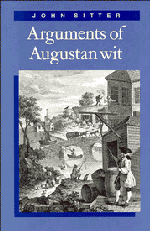Book contents
Introduction
Published online by Cambridge University Press: 28 January 2010
Summary
This book attempts to make collective sense of some of the major English texts of the late seventeenth and early eighteenth century, the period I have commuted to most regularly over the past two decades. Thinking about this special part of my literary education in and out of the classroom has often brought to mind two of the reasons Henry Adams gives for resigning his professorship at Harvard, reasons which may sound familiar to teachers in many other fields. Adams believed he lacked an adequate theory of his subject, and he felt that he was educating himself at the expense of his students. To the extent that the second feeling of uneasiness is independent of the first, one is likely to learn to live with it, perhaps even finding in it a productive humility and tension. Failures of knowledge or tact can be corrected, after all, day by day; and besides, “learning together” can be justified as Socratic pedagogy or simply accepted as a fact of academic life. But if one's classroom incoherencies begin to seem coherent – the result, in other words, of conceptual problems in the field as well as local shortages of information – then one may become desperate enough to write a book.
- Type
- Chapter
- Information
- Arguments of Augustan Wit , pp. 1 - 5Publisher: Cambridge University PressPrint publication year: 1991
- 10
- Cited by

